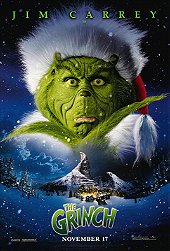In among the wondrous childhood memories implanted by Theodor Seuss Geisel (better known as Dr. Seuss) is the distinctly Seuss-esque Christmas tale entitled How the Grinch Stole Christmas. A Yuletide staple all over the world, the story was eventually adapted into a successful animated film back in 1966. Dr. Seuss may have passed away in 1991, but his legacy lives on. This brings us to the motion picture in question - Hollywood's live-action adaptation of The Grinch, for which an array of state-of-the-art technological wizardry was employed to bring the late author's beloved festive fantasy to life for a new generation. Directed by Ron Howard and produced by Brian Grazer, this particular appropriation of How the Grinch Stole Christmas was released in 2000, but it's hard to shake off the thought that padding out Dr. Seuss' original (short) story into a feature-length film was purely a business decision rather than an artistic one. The product is a handsomely-produced extension of the holiday classic, but it's deficient in one vital element: heart.
The story is so familiar that it will only take a few moments to refresh your memories. The Grinch (Carrey) lives in spiteful seclusion high on Mount Crumpit, overlooking the peaceful village of Whoville. Ever since he was a child, the Grinch has hated the inhabitants of said village. With Christmas fast approaching one year, little Cindy Lou Who (Momsen) tries to transcend the empty commercialism of the festive season by inviting the Grinch to the town's holiday festivities. But once things go pear-shaped, the Grinch hatches a supreme scheme to ruin Christmas for the whole of Whoville.
In Dr. Seuss' original book, the writer explained the Grinch's rather grouchy behaviour in only the vaguest of terms. He noted "No-one knows why; no-one quite knows the reason". For decades, millions of readers have accepted the Grinch's behaviour on those terms. Yet, in Ron Howard's big-screen adaptation, a back-story had to be conceived in order to stretch out the material to feature length. According to the back-story, the Grinch hates both the Christmas season and the Whos in Whoville due to a childhood trauma brought on by his school-mates. This doesn't quite gel, however. There are things which should be left to the imagination, and the Grinch's mean-spirited behaviour is one of those things. With the character given the cliché of a bad childhood, he can't be blamed for his nastiness. Ironically, the Whos were responsible for bringing about a nasty change in the Grinch's personality, thus when he steals their Christmas it's hard to feel bad for them. There's a disturbing lack of reality pervading How the Grinch Stole Christmas as well - it's an anti-commercialism story that ends with the Whos getting all their presents back...
Beneath the Oscar-winning make-up courtesy of Rick Baker, Jim Carrey gives it his all as the Grinch. But Carrey takes the role as an opportunity to work his usual slapstick shtick and project his trademark screen personality (think Ace Ventura with green skin). This is the problem - How the Grinch Stole Christmas unavoidably becomes a Jim Carrey vehicle; a fantastical stage upon which he can prance, pout, preen and indulge in amusing scenarios. He simply lacks honest-to-goodness menace, and his portrayal barely resembles the character written by Dr. Seuss. Of course, there should be deviations from the source material when creating a cinematic adaptation of a book to suit the new medium, but it's crucial for these changes to work. In this case, Jim Carrey's unique portrayal of the Grinch is extremely funny, but the added story arcs fail. On top of this, the screenwriters (Jeffrey Price and Peter S. Seaman) attempted to invent new rhymes. But no-one alive can write like Dr. Seuss could, especially not these two screenwriters whose rhymes are simply mundane.
Script quibbles aside, How the Grinch Stole Christmas has been immaculately assembled through staggering digital wizardry, lavish production design, Oscar-winning make-up and thousands of hours of pure hard labour. Bringing Dr. Seuss' wonderfully warped imagination into cinematic reality presented an undertaking of epic proportions, and the entire production design team should be congratulated for pulling off such a marvellous job. The phenomenal world created here is even faithful to Seuss' illustrations, with the buildings, the furniture, and all the interesting little doodads looking precisely like those imagined by the late author. Added to this, Sir Anthony Hopkins is wonderful as the narrator of the story. All the other members of the supporting cast, however, are so humdrum that they fade into the background while Carrey commands both the foreground and the middle ground.
How the Grinch Stole Christmas is not Ron Howard's finest hour; the director ostensibly relied so heavily on the elaborate sets and Carrey's comedic stylings that he offered nothing of substance or heart. It all feels very blah. Nevertheless, comparisons to Hollywood's usual festive output (Jingle All the Way, anyone?) are rather flattering for How the Grinch Stole Christmas - it's a few notches above the usual standard simply because it at least has moments of solid comedy. But does anyone else feel that someone like Tim Burton could have pulled off a far better all-round movie...?
5.6/10
 Login
Login